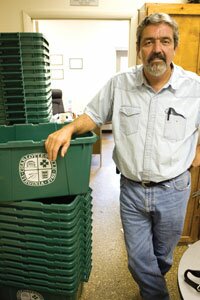GREEN- Single streamin': When going green saves some green

Commingling, says Steve Lawson, head of Charlottesville's public service, has increased the city's recycling 26 percent.
PHOTO BY WILL WALKER
The desire to recycle is powerful in many of us, especially when it's easy. That's why Charlottesville's quiet switch to single-stream recycling– obviating the tedious separation of glass and paper– is such a godsend to those who want to save the earth without getting their hands too dirty.
Despite little notice to the public beyond City Notes, the newsletter enclosed with utility bills, starting in February 2007, citizens could begin commingling their recyclables with abandon. By October, mixed paper was added to the pool.
The changes made an impact, as the amount of recycling collected between October and March increased by 301.26 tons over the previous year, a 26 percent increase, according to Steve Lawson, the city's public services manager. During that same period, trash tonnage headed for a landfill decreased by 226.08 tons, saving taxpayers over $14,000 in tipping fees.
All this came about after Allied Waste, the private company paid to collect city recycling ($345,400 in fiscal year 2007-08), saw an opportunity.
"We talked to the City and said we'd put it all together," says Allied's Tad Phillips. The change was also made possible thanks to Tidewater Fiber in Chester, a recycling sorter with facilities in Richmond, Chesapeake, and North Carolina. "We were able to piggy back on them," Phillips says.
Suddenly, Charlottesvillians could drop not just glass, aluminum, and paper– but also plastics and even cardboard and metal jar lids– curbside. And Allied could grab it all and ship it to Chester without having to separate the materials on the street.
As the numbers above indicate, Charlottesvillians are bolstering their recycling-to-trash ratios, and Lawson figures the trend will continue as the word gets out.
In theory, citizens and businesses should be seeing a drop in their garbage sticker fees– currently $2.10 per 32-gallon or $1.05 per 13-gallon trash can.
Sometimes it really does pay to be green.
#